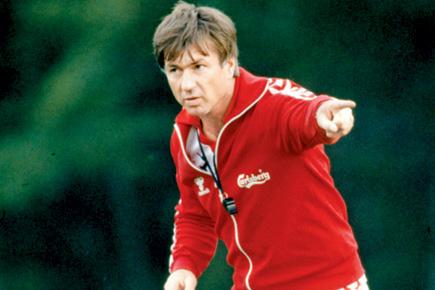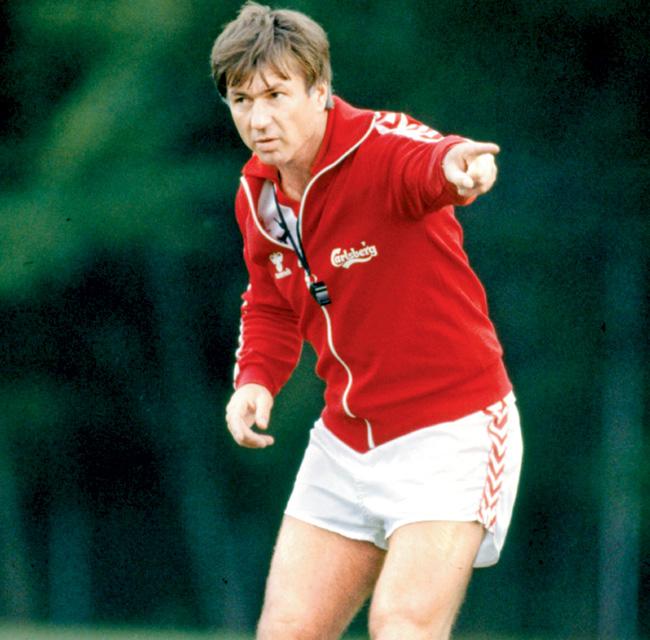The Danish national team might not have won any trophies in the 1980s, but Sepp Piontek's men played an exciting brand of football that earned them cult status

Denmark coach Sepp Piontek during a training session in 1981. Pic/Getty Images
The first chapter puts it best: "The best stories in life are the ones where those involved don't get the girl, the happy ending or even the Jules Rimet Trophy." Our age, with its off-putting emphasis on 'success', encourages football teams to play sterile, percentage football, with celebrated coaches telling their wards to defend and wait for mistakes from the opposition.
Denmark coach Sepp Piontek during a training session in 1981. Pic/Getty Images
It wasn't that way with Denmark in the 1980s. They went out in the second round of the 1986 World Cup, eviscerated 5-1 by a Spanish side ruthless on the counterattack, but had left their mark in the previous three games — beating Scotland (1-0), Uruguay (6-1) and West Germany (2-0).
ADVERTISEMENT
The Germans would go on to reach the final, denied glory only by Diego Maradona's ability to conjure up a pass when boxed in by four opponents. All these years later though, you remember next to nothing of that German side. Denmark are a different story, one that has been beautifully told in Danish Dynamite: The Story of Football's Greatest Cult Team.
It is the tale of a team whose players were itinerants long before English Premier League and La Liga riches made football the embodiment of globalisation. It is the narrative of a team that changed a culture of defeat within the space of a decade, and left behind memories that have lasted far longer.
It is also a story of what might have been. Before Michael Laudrup came along, Allan Simonsen was Denmark's greatest player. He remains the only Dane to have won the Ballon d'Or. In Denmark's opening game at Euro 1984, he broke his leg, an injury so severe that it effectively ended his career. Denmark reached the semifinals without him, losing on penalties to Spain.
Two years later in Mexico, he got 20 minutes as substitute against the Germans. A player who should have been revered as one of the game's greatest is almost unknown as a result. But the greatest what-if concerns that match against Spain, which Denmark led till the stroke of half time.
Then, Jesper Olsen played a disastrous square ball across his own penalty box. Emilio Butrugueno, who wasn't nicknamed The Vulture without good reason, popped in and applied the finishing touches. "But Jesper, Jesper, Jesper, that's lethal," said Svend Gehrs on Danish TV, a sentence that is still summoned up when people look back at that Queretaro afternoon when things fell apart.
Six years later, Denmark did win a trophy. The players were on their summer vacations when war-torn Yugoslavia were excluded from Euro '92. The Danes took their place and went all the way, beating the Netherlands on penalties in the semifinal, before seeing off the Germans to lift the trophy. That, though, was a far less thrilling side. The outstanding performer was Peter Schmeichel, the Man United goalkeeper.
Fairytale
While that triumph is cited as a footballing fairy tale, the team itself isn't remembered with the same fondness as the '86 vintage, whose fans chanted: "We are red, we are white, we are Danish dynamite!" The reason for that can be found in a famous quote from Danny Blanchflower, who won the league-and-cup double with Tottenham in 1960-61.
"The great fallacy is that the game is first and foremost about winning," he said. "It's nothing of the kind. The game is about glory. It's about doing things in style, with a flourish, about going out and beating the other lot, not waiting for them to die of boredom."
From their now-iconic Hummel kit to the way they passed and moved at breathtaking speed, there was nothing remotely boring about Denmark. "They stayed true to themselves right up until the end, an increasingly rare quality that everyone desires but few actively try to develop," says the book.
"Long after the medals have been handed out and the tournaments have been condensed into a short collection of memories, that is the detail that stays with everyone who saw them. To the victors went the spoils. The glory went to Denmark." Sepp Piontek, who coached that team for 11 years, never won a major trophy. Their story, however, is unforgettable.
Dileep Premachandran is editor-in-chief of Wisden India
 Subscribe today by clicking the link and stay updated with the latest news!" Click here!
Subscribe today by clicking the link and stay updated with the latest news!" Click here!







